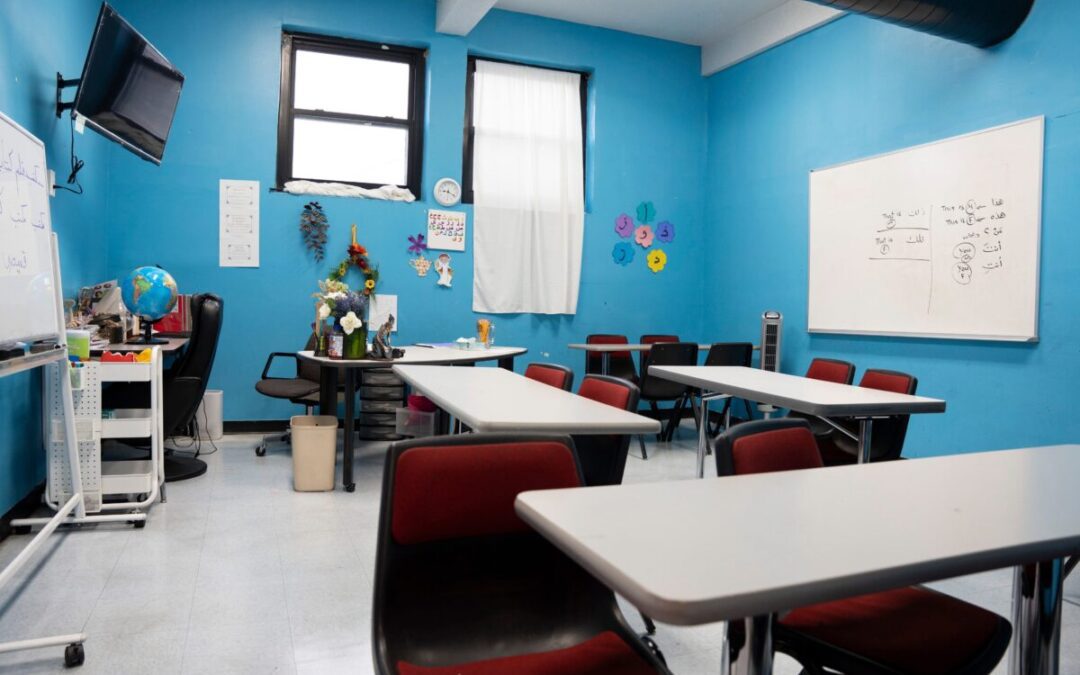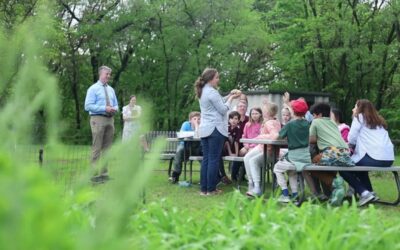
The Shell Lake school superintendent says one of the appeals of his small-town district is that its tight-knit staff is like a 'family.' Photo courtesy Shell Lake School District
Wisconsin public schools are dealing with an ongoing teacher retention problem with almost 40% of teachers leaving within their first six years in the field, according to a new report by the Department of Public Instruction (DPI).
When Todd Felhofer graduated from the University of Wisconsin-Eau Claire in 1984, his original plan was to become a city manager. But instead, four years later, he got a teaching certification from UW-Oshkosh and started teaching social studies in suburban Milwaukee.
“Once I got into education, I knew this is where I needed to be and stay,” Felhofer said.
Felhofer not only put in 12 years as a teacher, he then went on to become a principal. And now, 37 years and a few different districts later, he’s still in the field—as an administrator. It’s like a city manager, but for a school district—in this case, Shell Lake.
But Felhofer is noticing his kind of longevity is becoming increasingly rare in Wisconsin.
“To see somebody stay 25, 30, 40 years—it’s not the way it works anymore,” Felhofer said. “People are more willing to pick up and move on—the workforce has changed.”
‘Education workforce is in crisis’
School districts across the state are facing a massive challenge: keeping teachers working long-term.
Wisconsin is losing educators at two key junctures, according to the report by the Wisconsin Department of Public Instruction (DPI): when they complete teaching credential programs and during their first few years working as teachers.
In the 2021-2022 school year, just over 5,000 college students completed an educator preparation program, but only about 4,000 of those students became teachers, DPI reported.
Of those who do become teachers after completing their programs, about 40% leave the profession or the state within their first six years on the job.
“This report shows what we’ve known for some time now: Our education workforce is in crisis,” said State Superintendent of Public Instruction Jill Underly.
Underly points to pay as one of the likely causes. Teachers’ average compensation in Wisconsin has dropped 19% in the last 14 years, when adjusted for inflation. Compensation is what district officials cited in a survey as one of the reasons for educators leaving their jobs after the 2022-2023 school year.
The average starting salary for Wisconsin teachers is below the national average, according to a new report by the National Education Association. That report shows that a starting salary in Wisconsin averages $41,151 and the national average is $44,530.
“Our teachers need to be paid appropriately, and need to be respected and supported by our communities,” Underly said.
Despite making a significant impact on the lives of their students, teachers have been targeted by people pushing censorship and private school funding over the past few years in Wisconsin. So if they can get a better paying job with more respect somewhere else, why wouldn’t they?
RELATED: Teachers see a legacy of disrespect, Why disrespect is driving teachers away
Still paying the price

Photo courtesy School District of Shell Lake
The Washburn County community of Shell Lake has been home to Felhofer and his wife for the past couple of years, as he leads a rural public school district of about 600 students in grades 4K-12.
Teacher turnover in the state’s rural areas has been especially high since a law signed by former Republican Gov. Scott Walker in 2011 gutted teacher pay and all but eliminated collective bargaining rights.
“Pay has lagged behind,” Felhofer said. “Some of this is still post-Act 10 issues where it really cut into education in terms of funding it.”
Thirteen years later, districts are still paying the price for the “Budget Repair Bill” or Act. 10. And today’s Republican leaders haven’t prioritized fixing the harm it did.
Felhofer says that doesn’t bode well for his small district that would love to pay its staff more, but just doesn’t have the budget for it.
“We’re battling not only retirement or ‘it just isn’t for me,’ but people are transitioning to other districts for a little higher payday,” he said.
Creative recruiting
In any district, Felhofer would face a tough recruiting and retention problem. “There have been situations where we’ve had one or two candidates—which is great—if one is really good.”
With a lack of candidates, he said the hiring mentality has changed. “Often we’re not looking for a finished product,” he said. “What we’re looking for is ‘can we mold them?’”
“For a lot of years, we were looking for someone who we could just plug in and go. Now, we’re going to invest in them and get them training to get them to a place to do the job we hope they can do.”
It’s become common for superintendents to consider and discuss life experiences as part of the hiring process, Felhofer said, as many candidates aren’t fully certified for teaching. “That wasn’t even a consideration 15 years ago,” he said. “If somebody didn’t have a license, you weren’t even going to look at them.”
And while the beauty of northern Wisconsin is a draw to some, a rural district isn’t always where others want to be, especially if applicants are looking for a college-town feel with lots of amenities.
“If you’re into hunting and fishing, it’s a great place for you,” he said. “But if it’s like, ‘I like concerts and fine dining,’ there’s not much of that here.”
That’s why he also looks at a broader picture: Would a candidate be happy living there?
“You almost start looking at, ‘Where did this person grow up?’” he said. “If you grew up in a small town, you know a small town—you might be more comfortable in a small town setting and would appreciate it.”
Felhofer hopes incentives like longevity pay, a great work environment, a school calendar that allows for vacation time, and a supportive school board and administration will help get more than a few strong applicants in the door.
Support Our Cause
Thank you for taking the time to read our work. Before you go, we hope you'll consider supporting our values-driven journalism, which has always strived to make clear what's really at stake for Wisconsinites and our future.
Since day one, our goal here at UpNorthNews has always been to empower people across the state with fact-based news and information. We believe that when people are armed with knowledge about what's happening in their local, state, and federal governments—including who is working on their behalf and who is actively trying to block efforts aimed at improving the daily lives of Wisconsin families—they will be inspired to become civically engaged.


WI teacher: Federal special-ed cuts another blow to struggling state
By Judith Ruiz-Branch A Wisconsin teacher is voicing significant concerns about the recent federal special education cuts and says it’s an...

Wisconsin public school enrollment declines continue as vouchers grow, new data show
Enrollment in Wisconsin's public school districts has continued to fall, while other types of schools are gaining students, according to the state's...

It’s Banned Books Week. Here are some books that faced challenges in Wisconsin last year
Milwaukee librarians are encouraging residents to pick up a banned book this week. Oct. 5 to 11 marks Banned Book Week, where libraries, schools and...

Head Start moms won’t let Washington cut their kids’ future
While many of us were slapping on sunscreen and trying to soak up the last days of summer, moms across the country were dialing—and redialing—their...





